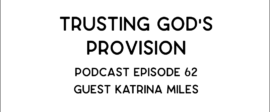God’s Provision (Luke 9:10-17; 12:4-7; 12:22-31)
Bible Commentary / Produced by TOW Project
Throughout Luke, Jesus teaches that living in God’s kingdom means looking to God, rather than human effort, as the ultimate source of the things we need for life. Our labor is not optional, but neither is it absolute. Our labor is always a participation in the grace of God’s provision.
Jesus Feeds Five Thousand (Luke 9:10-17)
God Provides for Normal Life, Remembers Worried Entrepreneur (Click to Watch) |
Jesus demonstrates this in actions before he teaches it in words. In the feeding of the five thousand (Luke 9:10-17), God, in the person of Jesus, takes responsibility for meeting the crowd’s need for food. He does it because they are hungry. Exactly how Jesus works this miracle is not stated. He makes use of ordinary food — the five loaves of bread and two fish — and by God’s power, a little bit of food becomes enough to feed so many people. Some of Jesus’ disciples (the fisherman) were in the food service profession and others (e.g., Levi the tax collector) were in civil service. He employs their accustomed labor, as they organize the crowd and serve the bread and fish. Jesus incorporates, rather than replaces, the ordinary human means of providing food, and the results are miraculously successful. Human work is capable of doing good or doing harm. When we do as Jesus directs, our work is good. As we so often see in the Gospel of Luke, God brings miraculous results out of ordinary work—in this case, the work of providing the necessities of life.
Jesus Teaches About God's Provision (Luke 12:4-7; 12:22-31)
Later, Jesus teaches about God’s provision. “I tell you, do not worry about your life, what you will eat; or about your body, what you will wear….Can any of you by worrying add a single hour to your span of life? If then you are not able to do so small a thing as that, why do you worry about the rest?” (Luke 12:22-31). Jesus offers this as plain common sense. Since worrying cannot add so much as an hour to your life, why worry? Jesus doesn’t say not to work, only not to worry about whether your work will provide enough to meet your needs.
Dispel Worry by Helping Others Succeed (Click to Watch)God gave Joe Kreutz, CEO of County Commerce Bank, relationships that made him feel secure enough to run his bank to help the community, customers and employees succeed, rather than worrying about himself. |
In an economy of plenty, this is excellent advice. Many of us are driven by worry to labor in jobs we don’t like, keeping hours that detract from our enjoyment of life, neglecting the needs of others around us. To us, the goal doesn’t seem like “more” money but rather “enough” money, enough to feel secure. Yet seldom do we actually feel secure, no matter how much more money we make. In fact, it's often true that the more successful we are at bringing in more money, the less secure we feel because we now have more to lose. It’s almost as if we would be better off if we had something genuine to worry about, as do the poor (“Blessed are you who are hungry now, for you will be filled,” Luke 6:21). To break out of this rut, Jesus says to “strive for [God’s] kingdom, and these things will be given to you as well” (Luke 12:31). Why? Because if your ultimate goal is God’s kingdom, then you have the assurance that your ultimate goal will be met. And feeling that assurance, you can recognize that the money you make actually is enough, that God is providing for your needs. To earn a million dollars and be afraid you may lose it is like being a million dollars in debt. To earn a thousand dollars and to know that you will ultimately be fine is like getting a thousand dollar gift.
But what if you don’t have a thousand dollars? About a third of the world’s population subsists on less than a thousand dollars a year.[1] These people may have enough to live on today, but face the threat of hunger or worse at any moment, whether or not they are believers. It is difficult to reconcile the hard fact of poverty and starvation with God’s promise of provision. Jesus is not ignorant of this situation. “Sell your possessions and give to the poor,” he says (Luke 12:33, NIV), for he knows that some people are desperately poor. That’s why we must give to them. Perhaps if all Jesus’ followers used our work and wealth to alleviate and prevent poverty, we would become the means of God’s provision for the desperately poor. But since Christians have not done so, we will not pretend to speak here on behalf of people who are so poor that their provision is doubtful. Instead, let us ask whether our own provision is presently in doubt. Is our worry in proportion to any genuine danger of lacking what we really need? Are the things we worry about genuine needs? Are the things we worry about for ourselves remotely comparable to the things the desperately poor need that we do nothing to provide for them? If not, then anything but Jesus’ advice not to worry about the necessities of life would be foolhardy.
.jpg)







.jpg)

